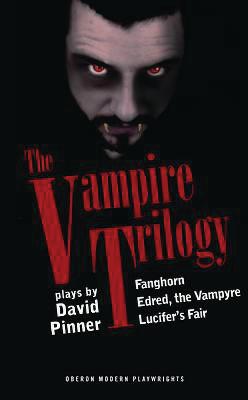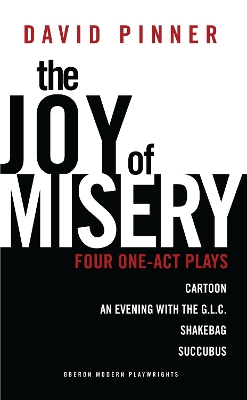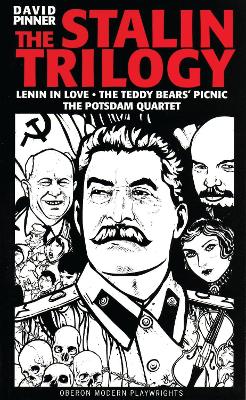Oberon Modern Playwrights
4 total works
Includes the plays Fanghorn, Edred, the Vampire and Lucifer's Fair
Fanghorn is a darkly-surrealistic comedy, which pokes fun at the Theatre of Cruelty. Fanghorn is a lesbian vampire, who invades the household of Joseph King, who may, or may not, be the First Secretary to the Minister of Defence, and hilarious emasculation and murderous mayhem follow in her wake. Edred, the Vampyre is a thousand-year-old Anglo-Saxon bisexual vampire, who slept with Shakespeare, but never bit him. Breaking all Bram Stoker’s vampire laws, Edred loves garlic and crucifixes, so he lives in the village church where he is confronted by two students who Googled him. But soon the students wish they hadn’t.
Lucifer’s Fair is the family Hallowe’en musical play, about a fair run by the Devil to entrap unwary children. Lucifer is aided by Fangs, who is a bovver boy by day, but an incompetent vampire by night. Simultaneously scary and funny, Lucifer’s Fair, with its comic spills, thrills and chills, highlights the unreliability of grownups, both the living and the undead.
Fanghorn is a darkly-surrealistic comedy, which pokes fun at the Theatre of Cruelty. Fanghorn is a lesbian vampire, who invades the household of Joseph King, who may, or may not, be the First Secretary to the Minister of Defence, and hilarious emasculation and murderous mayhem follow in her wake. Edred, the Vampyre is a thousand-year-old Anglo-Saxon bisexual vampire, who slept with Shakespeare, but never bit him. Breaking all Bram Stoker’s vampire laws, Edred loves garlic and crucifixes, so he lives in the village church where he is confronted by two students who Googled him. But soon the students wish they hadn’t.
Lucifer’s Fair is the family Hallowe’en musical play, about a fair run by the Devil to entrap unwary children. Lucifer is aided by Fangs, who is a bovver boy by day, but an incompetent vampire by night. Simultaneously scary and funny, Lucifer’s Fair, with its comic spills, thrills and chills, highlights the unreliability of grownups, both the living and the undead.
The Teddy Bears' Picnic and The Potsdam Quartet complete David Pinner's trilogy of plays featuring Joseph Stalin. The third play in the trilogy, Lenin in Love, was published by Oberon Books in October 2000. The Teddy Bears' Picnic explores the personal and professional conflicts between a group of musicians hired to play for Stalin, Truman, Churchill and Atlee at the Potsdam Conference in 1945. The musicians are confined to an anteroom in between playing for The Big Four. The leaders never appear, but their presence looms over the action. In The Potsdam Quartet Stalin takes centre stage, mainly in his role as the smiling, malignant host of the dinner parties held at his country dacha. His Politburo were forced to attend such parties, which combined terror with practical jokes.
Cartoon is a comedy about cartoons and the joy of misery. As Siegfried, the cartoonist, remarks; ‘If you cut succulent slices off people, then everyone laughs. However, if the scalpel slips, then you’re down to the bone. But then, of course, comedy is tragedy speeded up.’
An Evening With The G.L.C. is a play about public morality versus political expediency, and it exposes the dire state of London. Labour Councillor Rennip, who is on the G.L.C., faces some very awkward questions from his son on the combative TV Current Affairs programme ‘Confrontation’.
Shakebag is a farcical comedy about an amateur company’s chaotic rehearsal of Macbeth and A Midsummer Night’s Dream on the Bard’s birthday while the amused ghost of Shakespeare looks down from on high at the antics of his thespian ‘mechanicals’.
Succubus is Lili, who may, or may not be, a Mesopotamian storm demon or the Moon Goddess Herself. Mark, the Born-Again Christian, confronts Lili with his burning secret, and the play explores female myths, male fears, paganism and Christianity.
An Evening With The G.L.C. is a play about public morality versus political expediency, and it exposes the dire state of London. Labour Councillor Rennip, who is on the G.L.C., faces some very awkward questions from his son on the combative TV Current Affairs programme ‘Confrontation’.
Shakebag is a farcical comedy about an amateur company’s chaotic rehearsal of Macbeth and A Midsummer Night’s Dream on the Bard’s birthday while the amused ghost of Shakespeare looks down from on high at the antics of his thespian ‘mechanicals’.
Succubus is Lili, who may, or may not be, a Mesopotamian storm demon or the Moon Goddess Herself. Mark, the Born-Again Christian, confronts Lili with his burning secret, and the play explores female myths, male fears, paganism and Christianity.
Includes the plays Lenin in Love, The Teddy Bears' Picnic and The Potsdam Quartet
Three gripping political plays: Lenin in Love takes up the alleged sexual troika and sadistic inclinations of one of the foremost political leaders of the 20th century.
The Teddy Bears' Picnic is an ironic comedy which shows Stalin playing relaxed host and bon viveur in his country retreat. His Politburo guests are somewhat less relaxed. The Potsdam Quartet features four embittered musicians hired to entertain Stalin, Truman, Atlee and Churchill as they ‘divide up the world'.
Three gripping political plays: Lenin in Love takes up the alleged sexual troika and sadistic inclinations of one of the foremost political leaders of the 20th century.
The Teddy Bears' Picnic is an ironic comedy which shows Stalin playing relaxed host and bon viveur in his country retreat. His Politburo guests are somewhat less relaxed. The Potsdam Quartet features four embittered musicians hired to entertain Stalin, Truman, Atlee and Churchill as they ‘divide up the world'.



